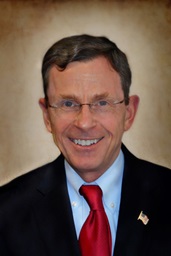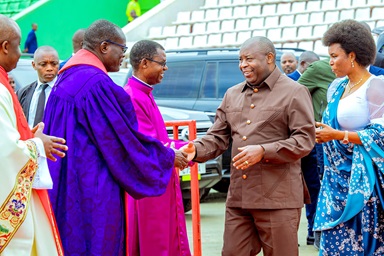Key points:
- The United Methodist Church has a long history of concern for social justice, beginning with Methodism’s founder, John Wesley.
- The church’s Social Principles, adopted by General Conference, provide a guide for faithfully addressing the issues of the day.
- Now is the time to learn more about The United Methodist Church’s commitment to social holiness, moral witness and ethical action. The Board of Church and Society provides resources to help.

Photo by Tessa Tillett for the Indiana Conference.
Commentaries
“United Methodists profess the historic Christian faith in God, incarnate in Jesus Christ for our salvation and ever at work in human history in the Holy Spirit. ... Our heritage in doctrine and our present theological task focus upon a renewed grasp of the sovereignty of God and God’s love in Christ amid the continuing crisis of human existence.” (United Methodist 2020/2024 Book of Discipline, Our Doctrinal Heritage, ¶102, page 47)
God so loved the whole world! (John 3:16)
Jesus declares his coming is to bring life and life more abundantly. (John 10:10)
Jesus brings good news in his preaching and declares it must be good news to the poor. (Luke 4:18-19)
I often quote a colleague pastor from Indiana who said, “United Methodists cannot transform the world by just going to church. We can transform the world by being the Church.”
Christian discipleship is the lifelong journey of growing in love of God and neighbor. Our neighbors are not just those in our neighborhood or our theological, ideological, geographical, cultural or political tribes.
The United Methodist Church, including its predecessor bodies, has a long and rich history of concern for social justice. In addition to carrying out acts of mercy, Methodism’s founder, John Wesley, spoke out against the abuse of animals, the exploitation of poor people and the treatment of human beings as chattel.
Just as we read in Genesis 1-2:15 of the goodness and diversity of God’s creation, we as United Methodists have a legacy calling upon people to respect, protect and care for all creation and all interrelated aspects of it.
I am a United Methodist in part because throughout my lifetime, The United Methodist Church has consistently stated its intent through church and community witness and General Conference actions to advance the cause of peace and justice.
In the church’s constitution, we declare we are part of the Church Universal, one Body in Christ. While affirming all people are of sacred worth, we also explicitly declare our commitment to racial justice, gender justice, climate justice, peace with justice and ecumenical relations.
Should United Methodists be advocating for justice in a nonpartisan way in the face of so much political, economic and humanitarian disruption?
Related commentary
“While we do not believe churches should affiliate with particular political parties, we do encourage churches to speak out boldly on social issues from a gospel perspective. We further believe churches have a right and responsibility to educate and equip their members to be effective advocates for justice in the wider world.” (United Methodist 2020/2024 Book of Discipline, Government Responsibilities, A., Church and Governments ¶163, page 136)
Like many people of faith and people called Methodist, we see justice as an expression of love personified and expressed best in healing of community and making right that which brings harm to others. That expression is the manifestation of the United Methodist Social Principles.
“The Social Principles provide our most recent official summary of stated convictions that seek to apply the Christian version of righteousness to social, economic and political issues.” (United Methodist 2020/2024 Book of Discipline, Our Doctrinal Heritage, ¶102, page 55)
The United Methodist Church’s Board of Church and Society is mandated to uphold the Social Principles adopted by the General Conference, the denomination’s top legislative assembly.
The prayerful, thoughtful and succinct Social Principles are not defined as progressive or traditional. They are globally relevant teachings with strong theological and biblical grounding.
At Church and Society, we engage individuals and congregations with our unwavering commitment to provide educational and practical resources for our United Methodist Social Principles; to organize communities to create positive social change; and to advocate with a worldwide network of elected officials, faith leaders and civil society influencers for the transformation of the world.
Oftentimes, it means taking a controversial stand against political policies and government actions that are in direct conflict with our Social Principles.
For example, I know that clinical workers and researchers in Southern Africa and at United Methodist-related Africa University who were engaged in the lifesaving work of fighting tuberculosis and malaria were interrupted because of the freeze on funding from the U.S. Agency for International Development, or USAID. Treatment for HIV-positive patients in Zimbabwe was also interrupted because access to drugs depended on humanitarian aid.
I have heard the testimony of clinicians and researchers whose jobs were their ministry — providing compassion and mercy in places based on need and not politics — who were forced to halt their work due to lack of funding.
Every nation’s budget is a moral document. No matter what political party or government entity is involved, United Methodists should speak out when food assistance programs and access to medical assistance for those in need are eliminated for millions of citizens. When diversity, equity and inclusion are defined by a president or lawmakers as a problem to be eradicated, rather than recognized as progress toward a more just society, it’s time to speak up.
When bills are passed that suppress access to voting and make it more difficult for women, persons with disabilities and communities of color to exercise their rights to vote, the church is compelled to speak out.
When the rollback of basic human rights and freedoms with arbitrary, inhumane immigrant and migrant deportations occurs, we must call it out and act.
When travel bans, monetary manipulation, environmental neglect and the withholding of historic commitment to humanitarian aid contribute to neocolonialism, while at the same time our backs are turned on global neighbors’ conflicts, without a commitment to the gospel imperative, we must speak out.
As a global church, we are called to proclaim Christ in all his fullness. If in this moment of existential crisis for democracy, decaying multilateralism and abandonment of decades of social progress we are too cautious for fear of disagreement, we may look back with regret as our children and grandchildren are left with a more polluted planet and a world divided by those who have all they want and those left wanting to survive. We need only to proclaim a gospel that hears and heeds the Judgment of the Nations in Matthew 25:31-46.
Now’s the time. Learn more about the United Methodist commitment to social holiness, forthright moral witness and ethical action. Visit the Board of Church and Society website www.umcjustice.org and read the Social Principles for yourself, as well as the Action Alerts and social priorities we are acting on right now.
We would love to hear from you. Don’t hesitate to contact us by email at [email protected] and offer us your feedback on social issues you care about. Also, you can subscribe to our network via our website (bottom of the home page) and join our effort to live faith, pursue peace and seek justice.
Be encouraged.
Trimble is the top staff executive of the United Methodist Board of Church and Society. He was elected and consecrated a bishop by the North Central Jurisdiction of The United Methodist Church in 2008. Upon retiring as bishop on Sept. 1, 2024, he began leading the board.



